Mar
26
2016
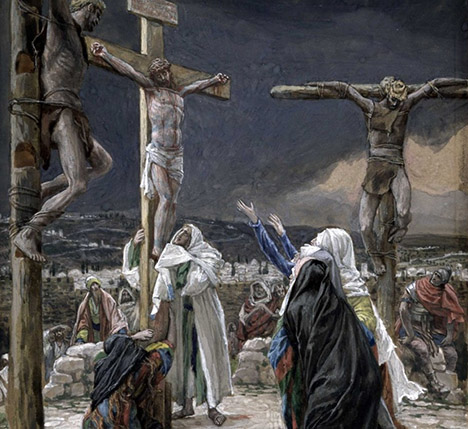
The abandonment of the Son by the Father is made palpable not in the crucifixion of His body, since He willingly laid down His life, but in the darkness which covered the Land for three hours. But perhaps this darkness was a sign of the Father’s nearness rather than His distance.
Continue reading
Comments Off | tags: Acts, Babel, Babylon, Crucifixion, Exodus, Ezekiel, Herod, James Jordan, Judas, Leviticus, Peter Leithart, Revelation, Tabernacle | posted in Biblical Theology, The Last Days
Jun
17
2015
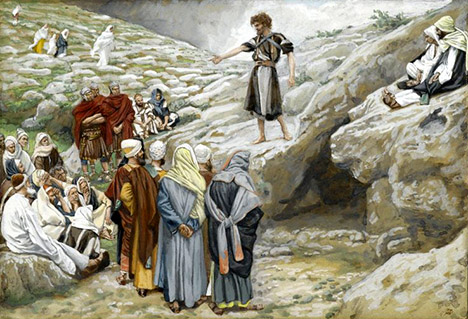
“Behold, The Lamb of God who takes away the sins of the world!”
“Repent and be baptized every one of you in the name of Jesus Christ for the forgiveness of your sins, and you will receive the gift of the Holy Spirit.” (Acts 2:38)
James Jordan has observed that Abraham’s “calling on the name of the Lord” was in fact evangelical proclamation of his faith. Abraham’s witness to the Canaanites was something for which they would be held accountable when Israel returned to claim the land. Chris Wooldridge sees this “vocal allegiance” as the key to understanding the meaning of the washing away of sins in the New Testament. Seen in the context of the last days of the Old Covenant, this was not baptismal regeneration but a public identification by the Jewish worshiper with the final sacrificial lamb (Leviticus 1:1-9).
Chris writes:
Continue reading
2 comments | tags: Abraham, Acts, Baptism, Chris Wooldridge, Covenant Theology, Leviticus, Peter | posted in Biblical Theology, Christian Life, The Last Days
Jun
16
2015
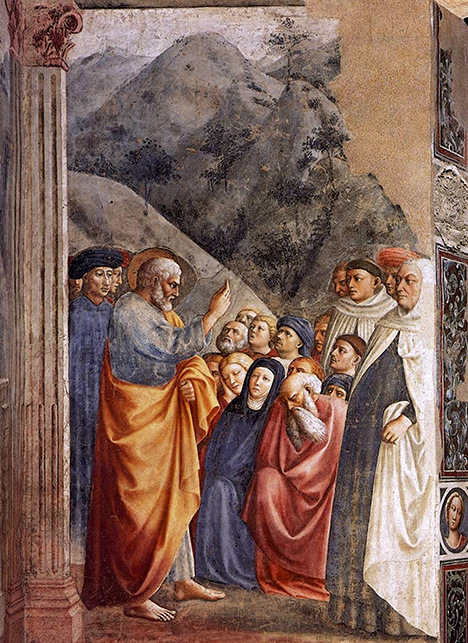
There are no “Abrahamic” promises concerning offspring — or real estate — for New Covenant believers.
Like the dogma of evolution, the doctrine of paedobaptism is not supported by indisputable evidence. Rather, the data must be interpreted through the lens of a pre-existing framework. The paedobaptistic lens is, however, a biblical one, being Abrahamic, and it comes in extremely handy when used in the right way. It deals with the few texts which paedobaptists rely on for proof, showing that they are not establishing a revised Abrahamic tent, but bringing the old one to an end.
Continue reading
4 comments | tags: Acts, AD70, Baptism, Circumcision, Ephesians, oikoumene, Paul, Pentecost, Peter, Tabernacle | posted in Bible Matrix, Biblical Theology, The Last Days
Mar
8
2015

Satan’s desire was always to turn the “pruning” of circumcision into an ax laid at the root of the tree of Israel.
A handful of treatments of the “massacre of the innocents” by Herod the Great see this bloodshed as the first of the New Covenant’s martyrs. But these miss the point of Matthew’s use of the word “fulfilled,” rendering it as good as meaningless. This massacre was the harbinger of the end of the old era and its promises. It said nothing about the promises of the new.
Continue reading
Comments Off | tags: Acts, AD70, Babylon, Baptism, Circumcision, Communion, Covenant curse, Covenant Theology, Herod, Jeremiah, Joseph, Literary Structure, Matthew | posted in Bible Matrix, Biblical Theology, The Last Days
Feb
26
2015

Baptism is not a Covenant boundary but a staff uniform.
“I have kept for myself seven thousand men who have not bowed the knee to Baal.” (Romans 11:4)
There is much talk today about the dichotomy between the visible Church (those who physically participate) and the invisible Church (those who are truly regenerate). The dichotomy exists because it often seems, as it was in the first century, that “not all Israel is Israel.” But the Bible never makes this distinction.
Continue reading
Comments Off | tags: Acts, Baptism, Covenant Theology, The Prophets | posted in Biblical Theology
Nov
19
2013
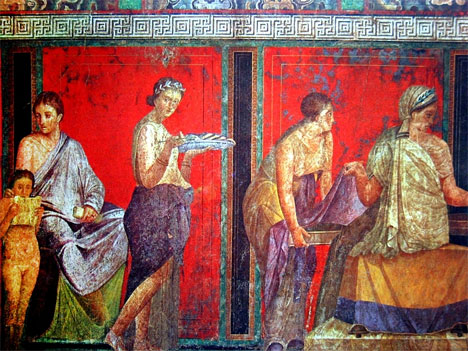 Part III – The Feast of Clouds
Part III – The Feast of Clouds
“But Peter said, ‘I have no silver and gold, but what I do have I give to you.”’ (Acts 3:6)
Israel consistently failed to keep the final feast, the Feast of Sukkot, because she took her calling to be elitist rather than priestly. She thought her calling, gifts and purification were for herself, rather than for the healing of the nations.
Continue reading
Comments Off | tags: Acts, Babylon, Baptism, Covenant Theology, Daniel, Esther, Feasts, Lampstand, Paul, Pentecost, Tabernacles | posted in Bible Matrix, Biblical Theology, The Last Days, The Restoration Era
Nov
1
2013
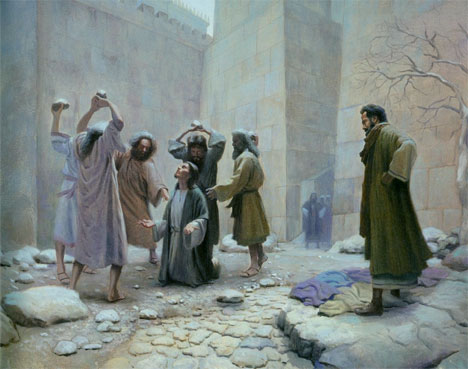
A Debtor to the Law
“Any commentary that misses the fact that the first century isn’t about Jew versus Gentile, but about the Noahic nations of the old world versus the birth of the Christian nations of the new, is way off the mark.”
We continue with the Deuteronomy section of Galatians, which has seven cycles. Paul moves from a Division/Passover motif to an Ascension/Firstfruits motif. That is, Paul gets all Levitical. It’s all about sex and death.
Continue reading
Comments Off | tags: Acts, AD70, Circumcision, Firstfruits, Galatians, Literary Structure, Stephen | posted in Bible Matrix, Biblical Theology, The Last Days
Aug
7
2013
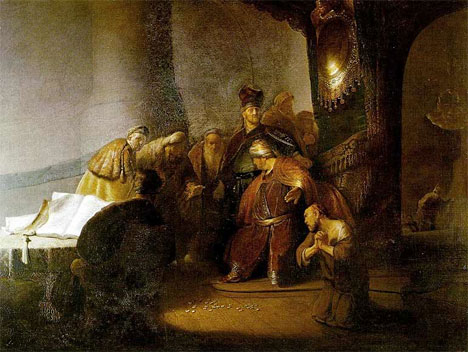
Covenant Structure in Zechariah 11
“The meek will eventually inherit the earth but the wicked will always have to buy it.”
Reading the book of Zechariah, like most Bible prophecies, is like tuning in to Season 3 of any good TV series without watching Seasons 1 and 2. Our problem today is not that we haven’t actually read the books of Moses (well, I hope we have) but that we haven’t been taught to read them into the prophets and the New Testament. We treat them like we’ve now switched channels, or shows, and the authors are starting with a blank canvas! However, the canvas isn’t blank. The prophets were God’s repo men, and their messages were all framed in the context of the Covenant contract. What amazes me is how inventive the prophets are (or the Spirit is) in coming up with something new and surprising using the patterns laid down in Moses.
Continue reading
Comments Off | tags: Acts, Esau, Herod, Judas, Literary Structure, Matthew, Minor Prophets, Passover, Pharaoh, Zechariah | posted in Bible Matrix, Biblical Theology
Aug
3
2013
 Abraham’s Bookends
Abraham’s Bookends
In his book Why Baptize Babies?, Mark Horne writes:
The apostle Peter makes it clear that God’s Covenant still involves the promise to our children:
For the promise is for you and your children and for all who are far off, everyone whom the Lord our God calls to himself.” (Acts 2:39) We who now profess Christ are among those who are “far off,” whom the Lord has called to himself. Just like those to whom Peter first preached, the promise is not only for us but for our children as well. (p. 23)
So much that has been written about baptism is nebulous and confused. My friend Mark’s short book, however, is an excellent summary of this doctrine. Having his points honed into silver bullets makes them easier to discern, and easier to deflect!
Continue reading
3 comments | tags: Acts, Baptism, Covenant Theology, Luke Welch, Mark Horne | posted in Biblical Theology, Quotes
Jun
1
2013
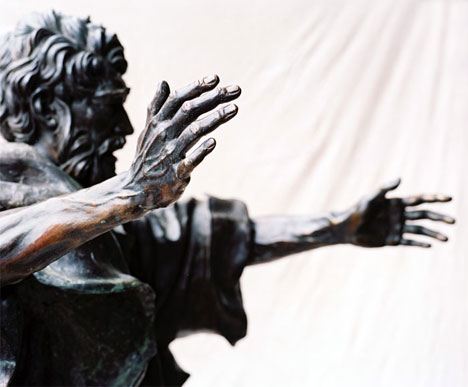
How does Peter see the apocalyptic imagery of Joel in the events of Acts 2?
The first step is to take note of the context of Joel’s prophecy. It is the coming destruction of Jerusalem in 586 BC.
And it shall come to pass that everyone who calls on the name of the Lord shall be saved. For in Mount Zion and in Jerusalem there shall be those who escape, as the Lord has said, and among the survivors shall be those whom the Lord calls. (Joel 2:32)
Even if we identify the context, it may sound to us as if Joel is still looking forward to the first century events at the end of his predictions. The unfortunate chapter break between 2 and 3 stops us reading further, but if we keep reading without a break, the beginning of chapter 3 makes it clear that Joel is still speaking about the restoration from exile. God would judge all the Canaanite nations, including Israel, who had behaved like a Canaanite. But only Israel would resurface from the “flood” of Babylonian control, while all the Canaanite powers remained scattered forever. And Israel would be vindicated across the world, from India to Ethiopia, in the events of the book of Esther (predicted in Ezekiel 38-39).
This means that the particular “day of judgment” had already passed by the time Peter quoted the prophet, so he is not quoting the prophecy to announce its soon fulfillment. He is, however, announcing a similar destruction of Jerusalem and its Temple, with all that this entails.
Continue reading
Comments Off | tags: Acts, Joel, Pentecost, Peter | posted in Biblical Theology, Q&A, The Last Days



































